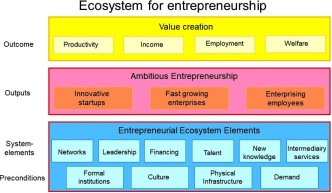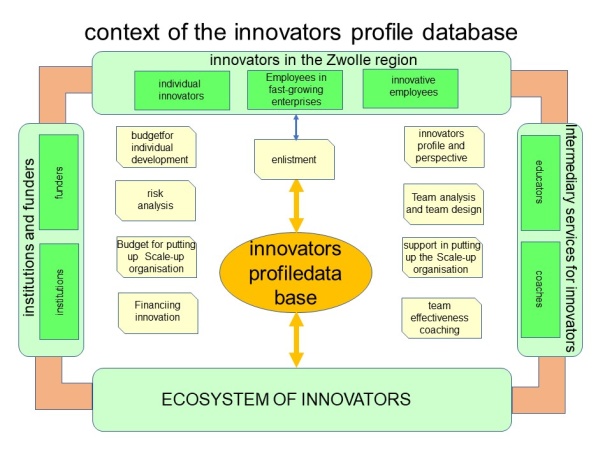INNOVATORS PROFILE DATABASE
Ecosystem for entrepreneurship
The ecosystem approach offers a framework for the diagnoses of the strengths and weaknesses of the social-economic structure of a region. It offers a language and starting point for a dialogue of stakeholders in the regional economy eventually leading to policy interventions aimed at the increase of welfare in the region.
All policy interventions must be focused on Value Creation, for instance by stimulating Ambitious Entrepreneurship. Subsidising a specific system element, for instance intermediary services such as educating or coaching startup entrepreneurs, could not be an end in itself.
Successful innovation entrepreneurship is quite difficult
Despite all efforts, in reality, more the 95% of the innovation initiatives fail.
Very often the failure occurs in the transition from startup to the scale-up phase, when the young entrepreneurs need to scale up their beautiful business idea to a full-blown organisation.
This transition, 'when a caterpillar becomes a butterfly' has the character of a complete metamorphosis. Exactly there things go wrong, while the right support is lacking. There are a number of causes, for instance:
* the entrepreneurs (members of the team) do not grow with their mission, they fail to develop into
the inspiring leaders, needed to breathe life into the organisation;
* The 'team' lacks the knowledge and experience to put up a functioning organisation;
* The entrepreneurs do not realise that the situation now has changed: instead of propagating a
fantastic idea, they need to fight for a place in the chain, where others already have their place;
there is the need for a different 'storytelling'...
It concerns the (often young and unexperienced) person himself !
In spite of all elements and preconditions that have been set up for stimulating innovation, and all education and coaching processes, how perfect and professional they may be, it are not the teachers and coaches that can force the success of an innovation enterprise. It concerns the entrepreneur in person, and, even more important, the team itself!
What they are thinking and doing, what actions they take, how they arrive at their conclusions and decisions. What observations they miss, what gaps they leave and risk they introduce and their awareness thereof. How they network, make friends and enemies, etc. These entrepreneurs and the team can only help themselves!
By, based on their individual motivation and their own talent, accelerating the development of the own personality. And by growing a complete and solid team, diverse and complementary, up to the challenge of building a successful enterprise. Building the organisation means that a large number of disciplines and attention areas must be covered.
The great challenge for the young entrepreneurs
An inventory of attention areas that need to be covered in the new scale-up organisation is shown in the blueprint of disciplines and roles in scale-up organisations.[1]
Barely anyone, not even the most skilled and experienced entrepreneur, is able to, just by himself, fulfil all of these roles.
In the setup of a scale-up organisation, the central target is tot create a more or less complete team, that covers all of these attention areas.
But that is not the sole issue.
The team must play together in harmony, such that no person involved becomes isolated and embarks on a different track and loses the other team members.
This may sound easy, but it is just there it often goes wrong.
Close, everlasting friendship may, in a few weeks' time, suddenly come to an end, when partners grow apart when their insights about the companies challenges start to differ.
Accelerated personal growth, the ability to grow with the expanding organisation and the challenges in the market, is an absolute precondition.
But what if one person is able to grow fast, while the other lacks behind? This can be very painful especially when the pioneers have been close friends.
Fighting for a position in the chain is very different from telling the eureka story of a new bright idea.
It is always very difficult to make a new concept profitable. 95% of the efforts turn out to fail!
All of these hurdles must be taken by the entrepreneurs.
Of course others may be hired for helping out, but this may not be done to the detriment of the building of the creation of a solid team which grows with its challenges.
Conclusion:
If we really wish to have an impact on the potential succes of emerging scale-up organisations, we need to stimulate the personal growth of the entrepreneurs themselves, and help them to become a complete and solid team.
We studied the above identified problems with an informal advisory group, focusing on the question:
FROM STARTUP TO SCALE-UP: what lies ahead of the young entrepreneurs and how can we support them to realise the transformation?
[1] Blueprint of disciplines and roles
ATTENTION AREAS AND ROLES IN SCALE-UP ORGANISATIONS
1 Managing Director
The Managing Director of the Scale-Up enterprise is the representative of the company to the outside world. As the helmsman of the organisation and the chairman of the Management Team he/she inspires the staff members and all people involved with a sense of direction. He/she is an excellent networker with strong persuasiveness and vision.
2 Marketing
Marketing, as an area of attention in a Scale-Up company, includes the acquisition and strengthening of knowledge about the market, while positioning the company and its products/ services in that market. For the infant enterprise, this means to find a way how to penetrate in the current chain, competing with well settled parties and/or the creation of a new market.
3 R&D Innovation
The domain R&D Innovation covers the process of Innovation Management, from Ideation, the conception of ideas and concepts, until the market launch, promotion and conviction of the target audience. The R&D manager has a strong drive and a talent for communication, but he/she also possesses a firm analytical competence and power to convince the different stakeholders.
4 Sales
The attention area Sales includes the process of market launch of the company's products and services, with all accompanying measures, and the operation of the service organisations: technical services and client services. The role of the Sales Director requires a strong commercial focus, persuasiveness and impact. Especially also the power to mobilise the organisation's own staff in service mindedness.
5 Business Operations
The field of Business Operations covers mainly 'Ordinary Management', the whole process from purchase, logistics, production, distribution and sales logistics. For the Scale-Up company this includes the design and deployment of processes and procedures, the instruction training of the staff, the maintenance of procedures and the ongoing process of improvement and effectivization.
6 Management Finance & Funding
Managing Finance and Funding includes organizing cash management and mobilizing investment capital, that make the enterprise 'running'. The manager observes critically the capital burn-rate and financial risks and he/she maintains excellent relations with the financial stakeholders. Of course, a good relation with his/her colleagues is of prime importance, such that all member of the Management Team are aware of the progress and that surprises can be avoided.
7 Controller
The Controller in the Scale-Up enterprise has a crucial role in bringing about the information circulatory system of the organisation. Bookkeeping is but one of the issues. Moreover, his/her role also includes the 'implant' of performance indicators, that enable to Management Team to follow progress and effective keeping the finger on the pulse. And, last but not least, leading the administrative process and personnel.
8 ICT
ICT-leadership means the responsibility for the development and maintenance of the information systems that supports the organisation's functioning. It not only includes financial systems, goods information systems, personnel information systems, but particularly also the information systems that make it possible for the leaders to come to the right conclusions and decisions.
9 Personnel/HR
The term Human Resource Management actually represent a worn-out way of perceiving the job. Employee administration and labour sourcing are important, but also the mobilisation and motivation of living people in a lively and evolving organisation. It are human beings that effectuate the quality in products and services, and that make the company attractive and create its appearance.
10 Talent Development & Education
Talent Development & Education are crucial, especially for Scale-Up companies. The growth of the company needs to be realised 'bottom-up' by developing people. who will grow with the organisation. Besides, the organisation must not spoil the originated tacit know-how: the knowledge that is in the people and has not been explicitly documented. The growing base of best-practices, however, must be documented in order to further professionalize the growing company.
11 Customer Services
Customer Services is the focus field which, in the end, after the growth phase, will be the distinguishing factor for customer satisfaction. Customer Services will help the company to achieve high loyalty of its main customers. And, from the early start, Customer Services will be a good source of information about the quality of the company's products and services. And it will lead to further professionalisation of the production process.
12 Organisational Development
Organisational Development is for a Scale-Up company the factor that enables growth. The organisation will, again and again, meet growth thresholds. And if it is not able to take such hurdles smoothly, this would lead to stagnation and loss of quality. Continuous adaption of organisation structure, way of working and the development of communication lines within the company asks for continuous management attention.
The advisory group has defined the attention areas and roles, that need to be in place in Scale-up organisations (see the blueprint above), developed instruments for the acceleration of the personal development of the individual entrepreneurs, for the composition of a complete team, and defined a process to help the newly composed management team to a strong and solid team.
They also developed the software with which a Profile database for Innovators can be built. This database can be used to help individual entrepreneurs to accelerate their personal development, for the effective composition of complete management teams or for composing highly creative Natural Working Teams.2]
We will, in co-operation with local organisations, put up a Regional Innovators Profile database for all innovators in the Zwolle Region in North-Eastern Netherlands. This database will support the individual innovators, teams and organisations in their development.
[2] A Natural Working Team is a temporarily group of people for solving a complex problem.
The Regional Innovators Profile Database will offer the entrepreneurs the possibility to, if required, identify external candidates that may complete a management team with candidates that can fulfil the lacking roles.
The database helps us also to compose, if required, cross-pollinating, multi-organisational Natural Working Teams for identifying solutions for 'wicked problems' or innovative solutions for a challenging problem statement.
The Innovators Profile Database contributes to the networking of innovators, such that a regional innovation ecosystem really can be achieved.






